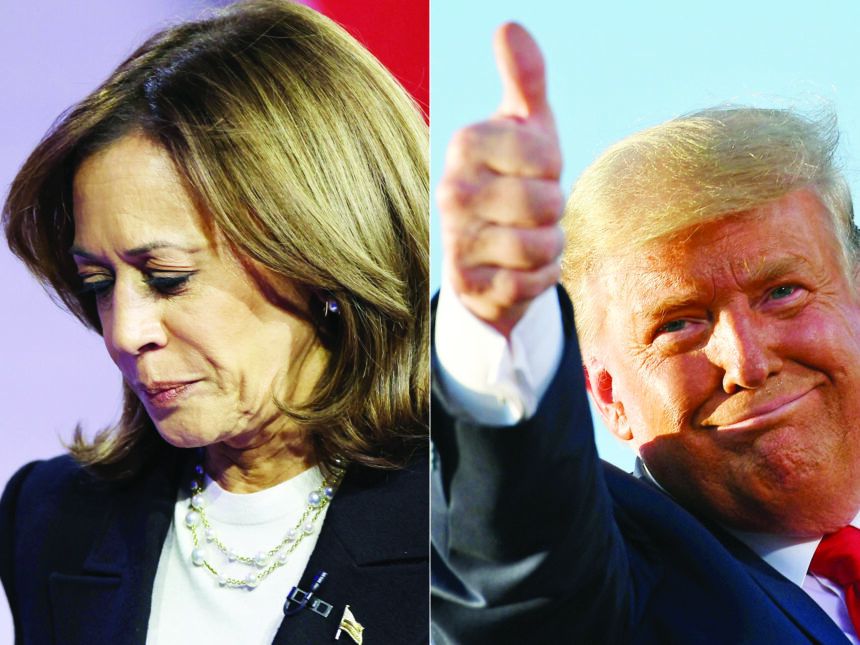Like the proverbial cat, Donald Trump has nine lives.
From an avalanche of lawsuits, convictions, persecutions and even an attempt on his life on 13 July while addressing a rally in Butler, Pennsylvania, which killed one rallygoer and wounded two others, Trump triumphed.
His win in Tuesday’s presidential election against vice-president Kamala Harris comes on the back of a heated campaign in the United States’ election.
As one of the most polarising global figures, Trump’s leadership style continues to generate uncertainty in international relations.
His first tenure was marked by occasional rhetoric which seemed dismissive of African nations, contributing to concerns about his commitment to fostering positive diplomatic ties across the globe.
The campaign was dominated by his trademark incendiary rhetoric, and it is likely to leave much of the world on edge.
When the campaign hit its zenith, he promised to tackle a range of domestic issues, including immigration and inflation.
Typical of Donald Trump, he signalled a return to his ‘America First’ foreign policy, which has often been characterised by a more isolationist stance and reduced emphasis on international collaboration.
He made bold claims about his ability to end Russia’s war against Ukraine within 24 hours of taking office, bring peace to the Middle East, and assert dominance over China, one of the United States’ most significant geopolitical rivals.
For seasoned diplomat Tuliameni Kalomoh, there is no need to lose sleep over the future relationship between Namibia and the United States.
It will remain largely unchanged, he said yesterday.
“Our relationship with the Americans will not change. In terms of trade, we sell them diamonds. We will sell them uranium and other commodities. I do not think that will be disrupted, because it’s in their interest. They provide us very generous financial support towards the United States President’s Emergency Plan For AIDS Relief (PEPFAR),” said the former ambassador.
Even though PEPFAR is the brainchild of former US president George W. Bush, all his successors continued to honour its commitment.
One of the fundamental foreign policy clashes between Namibia and the US is the fight for self-determination by the Saharawi people in Western Sahara.
“We all remember that Trump had recognised the Moroccan sovereignty over Western Sahara. It was tragic. The other fundamental foreign policy interest for Namibia is Palestine. Now, Trump had recognised Israeli sovereignty over East Jerusalem, and they moved the American embassy from Tehran to East Jerusalem, calling Jerusalem the eternal capital of the Jewish state,” he recalled.
Kalomoh also said Trump recognised Israeli sovereignty over the Golan Heights, the Syrian territory Israel captured during the 1967 war.
“Mind you, there is a provision in international law that no territory can be acquired using force. But Trump, with the gradual government in Israel, ignored that international law,” he stated.
Kalomoh added: “For Namibia’s interest, it’s the vexing trade and financial blockade of Cuba. More than 60 years old. And Obama had relaxed some of the sanctions; Trump came to power, reimposed such sanctions, and introduced additional ones. This causes unbearable suffering and economic dislocation in Cuba. When (Joe) Biden came to power, he did nothing to reverse any one of those policies Trump introduced.”
Politician and also former diplomat Kaire Mbuende said even after the popular vote, there is an electoral college, and the result could be different.
“These two candidates are focusing on similar issues: abortion and issues of immigration, because their foreign policy may be the same. But for the American people, it’s a big difference. That is why we are seeing a higher level of participation than usual,” he added.
What is strange for Mbuende, however, is that Africans featured nowhere significantly during the US presidential campaigns.
“The fact that Africa doesn’t feature prominently in the election campaign is a blessing in disguise,” he said.
He added: “It’s good because then they will allow Africans to shape their own agenda. And when we, as Africans, engage the US, we will engage them on our terms, in terms of our understanding of our reality.”
Close to Mbuende’s heart from a foreign policy perspective is the embargo against Cuba.
“President Obama expressed himself that it’s about time to lift sanctions against Cuba. And that means the victory for the Democrats. We may see a relaxation of American policy towards Cuba, an opening, a greater opening; whereas the Trump administration will see the same halt in terms of relations to Cuba, in terms of relations on the question of Palestine,” he observed.


